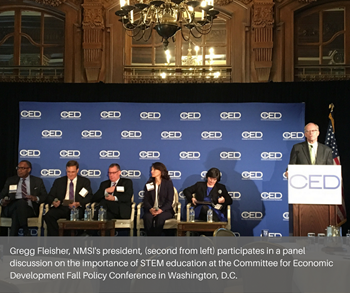Expert Panel: More Programs like NMSI’s Needed
Teri Yago-Ryan |
November 23, 2016
 This is a guest post by Teri Yago-Ryan, NMSI’s director of state & federal programs.
This is a guest post by Teri Yago-Ryan, NMSI’s director of state & federal programs.
A STEM-educated workforce is a necessary foundation for maintaining a technological advantage for national security, said Mary Miller, Principal Deputy Assistant Secretary of Defense for Research and Engineering at the U.S. Department of Defense, during an economic development policy discussion on Nov. 16.
“It’s incumbent upon us to maintain a strong STEM pipeline workforce,” she said, noting that the DOD employs 46 percent of the engineers in the federal government.
Miller’s remarks came during a NMSI-sponsored panel discussion on the importance of STEM education at the Committee for Economic Development Fall Policy Conference in Washington, D.C. The two-day event convened national thought leaders from the business, policy and academic sectors. Other panelists included NMSI president Gregg Fleisher; Michael Lach, director of STEM policy and strategic initiatives, University of Chicago; Cecelia Smith, VP and manager of the, mixed signal automotive division, Texas Instruments; and David Williams, managing principal for government affairs, public policy and corporate citizenship for Deloitte LLP.
The single biggest challenge of successful STEM education is creating programs that are scalable with a focus on interventions that produce measurable, meaningful results, like NMSI’s College Readiness Program.
“If we’re going to solve this as a country, we need to involve the many groups, communities and businesses committed to taking on this problem. Our best way forward is to emphasize programs that work and produce meaningful data,” NMSI’s Fleisher said.
NMSI boosts Advanced Placement® performance at partner schools by 10 times the national average and builds teacher capacity to advance student achievement beginning as early as third grade. . NMSI’s programs show that early involvement and consistent support lead to long-term results. Williams, of Deloitte, said too many programs begin too late in a child’s academic trajectory.
“Stop focusing at the end of the pipeline with college students and graduate students,” he said. “Instead let’s ask how come we’ve lost a bunch of girls? How come 80 percent of high school students are disinterested in a STEM field? Dive in early and invest where you can have the most impact with programs that work and have measurable outcomes,” he said as a message to business leaders.
TI’s Smith concurred, saying that groups like NMSI need to “create moments where students of all backgrounds and all ages fall in love with science, sparking the next generation of innovation.”
While all the panelists agreed NMSI’s programs serve as a model for STEM education, both by starting early in the academic pipeline and producing measurable results, U.S. Representative Susan Davis (D-CA) underscored the importance of continued investment in STEM programs in the years to come.
“STEM skills, as well as soft skills in communication and creativity, are essential to students’ ability to adapt to a quickly changing world,” she said. “STEM education should never be a partisan issue.”